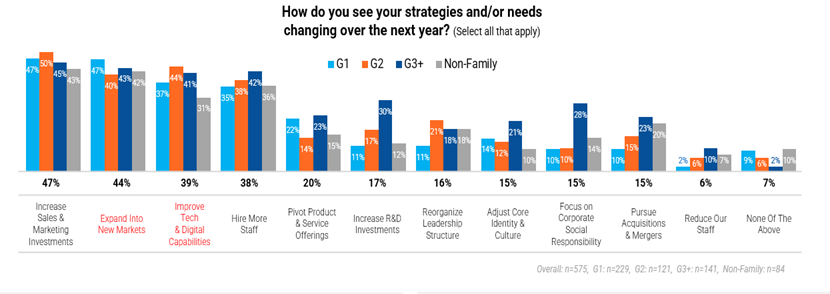In the dynamic landscape of family and privately-owned businesses, the pursuit of growth and expansion into new markets emerges as a pivotal strategy poised to shape their trajectory of success. Recent surveys have unveiled a resounding consensus among family business leaders: the imperative to explore untapped territories ranks among the top priorities for strategic evolution.
As we delve into the intricacies of market expansion, it becomes imperative to unravel the methodologies, stakeholders, and considerations that underpin this strategic endeavor.
Understanding Market Expansion Dynamics
As family businesses seek new ways to stay competitive and a step ahead of their counterparts, expansion into new markets become necessary for long-term, sustainable growth. To underscore the prevalence and significance of this strategic imperative among family businesses, third-generation (and beyond) family members employed by the business who responded to First Bank’s 2024 Family Business Survey* were most optimistic about both the economy and the growth of their businesses.

This sentiment is reflected in their strategic plans to hire more staff (rose 18 percentage points over last year) and expand into new markets (rose 9 percentage points) over the next year.
“In the years following the COVID pandemic and its’ financial impact, many companies are finding the need to not only deepen their relationships with existing clients, but also to widen their reach,” said First Bank Senior Vice President and Director of the Center for Family-Owned Businesses Ed Hart. “Focused on supporting and educating family business owners, we recognize that so many of the common issues we address, such as widening client reach through market expansion, also pertain to privately-held business owners, as well.”
Determining New Markets
Whether it’s a key decision-maker or family business member spearheading the conversation and initiative surrounding market expansion, to identify and assess potential new markets, family business leaders should utilize the many resources available to them during their decision-making process. This may include extensive market research, industry trends, data analytics, and consumer insights.
Often, family businesses will not only engage family members in the conversation but also executives, advisory boards, and external consultants to determine if entering new markets is the right step for their family as well as the long-term future of the organization.
Assessing Opportunities and Risks
There’s an array of opportunities available through expansion into new markets, including access to a new client base, diversification of revenue streams, and enhanced brand visibility.
However, as with any new venture, there are always inherent risks and challenges to consider, such as market volatility, regulatory complexities, and operational scalability. Other considerations may include market saturation, competition, language barriers, and the culture of both the organization and the market in question.
To help mitigate risks associated with market expansion, business leaders should consider enlisting the assistance of trusted, external experts and strategic partnerships as well as implement thorough due diligence and agile market entry strategies.
“One of the common denominators in any successful business is the recognition of not having all the answers internally,” Hart said. “Seeking and relying on outside experts shows humility, wisdom, courage, and trust, all attributes that make businesses and business leaders great. Working with people outside of your organization and tapping into their expertise, is an effective way to become more competitive and successful.”
While navigating the complexities of new market expansion, business leaders should remain agile, responsive, and open-minded to the idea of seeking additional or new opportunities that may be available to their organization.
As family businesses embark on the journey of market expansion, the path ahead is fraught with both promise and peril. By leveraging robust methodologies, engaging key stakeholders, and embracing a mindset of innovation and adaptability, enterprises can navigate the intricacies of new markets with confidence. In doing so, they unlock a world of opportunities, propelling themselves toward sustained growth in the years to come.
To learn more about the First Bank Center for Family-Owned Businesses, our offerings for family businesses, or to engage in a conversation about expansion for your business, contact the First Bank Center for Family-Owned Businesses or visit www.first.bank/familybusiness.
A qualified respondent is currently involved with a family business AND is a family member.


